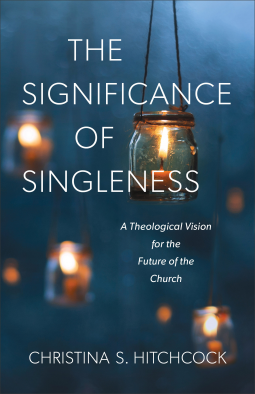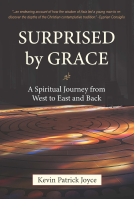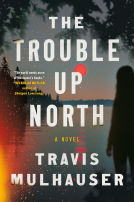
The Significance of Singleness
A Theological Vision for the Future of the Church
by Christina S. Hitchcock
This title was previously available on NetGalley and is now archived.
Send NetGalley books directly to your Kindle or Kindle app
1
To read on a Kindle or Kindle app, please add kindle@netgalley.com as an approved email address to receive files in your Amazon account. Click here for step-by-step instructions.
2
Also find your Kindle email address within your Amazon account, and enter it here.
Pub Date Oct 16 2018 | Archive Date Nov 13 2018
Baker Academic & Brazos Press | Baker Academic
Talking about this book? Use #TheSignificanceOfSingleness #NetGalley. More hashtag tips!
Description
Available Editions
| EDITION | Other Format |
| ISBN | 9781540960290 |
| PRICE | $25.00 (USD) |
| PAGES | 176 |
Featured Reviews
 Sarah F, Reviewer
Sarah F, Reviewer
The Significance of Singleness is a theologically academic look at the state of the position of singles in the (primarily American) church today. In the opening chapter, the author takes a look at the view of singleness in the (evangelical) church today. Generally, this view is marriage is good, singleness is a waiting area for marriage, and if you're single for long, something must be wrong with you! She also speaks of the "Marriage Mandate Movement" that originated with Focus on the Family. Personally, as a single, I'm very thankful I did not cross paths with this ideology per se, but have experienced similar underlying currents in the churches I have been a part of. Subsequent chapters look at the lives of influential singles in the history of the church - Macrina, Perpetua, and Lottie Moon. The author concludes with a look at how the view the church takes of singles can impact the role of women in the church, marriage and homosexuality, and friendship. This work should be read by those in leadership of churches in order to get a view of how singles are seen in their congregations. A welcome follow-up to this project would be a trade version for a wider audience. This is a topic that needs to be addressed more in our churches today.
 Conrade Y, Reviewer
Conrade Y, Reviewer
Singleness is a topic that is taboo among some young people. This is especially so for people living in cultures that elevate marriage above singlehood; setting up families; fear of loneliness; and producing babies for the next generation. In such societies, the default thinking is that if one is unmarried, then something seems amiss. In such an environment, there is pressure and desperation the older one stays single. Even churches are not immune. In fact, some churches frown on singles or tend to create programs catered more to families and married people. The truth is, singles are significant too. The author realizes this even as she was applying for Bible school, knowing that chances of getting married in such places are slim. It was a struggle for her to want to achieve her potential on the one hand but fully aware of her single status. She grapples honestly with her personal emotions while trying to make sense of cultural norms and biblical teachings. This book is a result of that exercise. Instead of letting culture define happiness in terms of marriage and family, she affirms the significance of singleness through the lens of the kingdom of God. Singles can play their part in community building, in gospel sharing, in becoming God's agents in the kingdom of God. She invites the whole Church at large to work together toward a theological vision and acceptance of singlehood for the gospel ministry.
There are three parts to this book. Part One looks at the cultural climate and in particular analyzes the "American evangelicalism's understanding of marriage." This is a riveting chapter that critiques the culture that puts the "Marriage Mandate" superior over all others. Such a mood pressurizes unmarried young people unnecessarily. Those in their 20s and 30s are most vulnerable to such cultural pressures. Even Christian organizations have unwittingly promoted the state of marriage to the detriment of the value of singlehood. Hitchcock wants to correct this with a value proposition: that being single is theological significant too. She points out how many organizations glorify marriage directly or indirectly. Books talk about them. Programs emphasize them. Society generally consider them more significant than others. She compares the realist and romantic understanding of sex where the realist sees sex as an eventual occurrence while the romanticist sees love as the necessary condition for sex and marriage. Such a view has roots in individualism where one will not be fulfilled with some form of sexual fulfillment. Organizations like "Focus on the Family" and marriage centered articles do not help in encouraging the significance of singleness. Theologically, Hitchcock expands on the apostle Paul's advice about remaining unmarried. Jesus responds to the question of marriage by looking beyond earthly perspectives toward heavenly ones. Celibacy is significant because it helps one focus on marriage as between Christ and the Church. This teaching is lacking especially in Protestant churches. Briefly, celibacy promotes paying greater attention to the priority of the Church; to the reality of the resurrection that is to come; and to the way we place our trust. In fact, Hitchcock is convinced that the proper understanding and valuing of singleness will do more to unite the Church and give dignity to all, both married and unmarried persons.
Part Two looks at the lives of three women, Macrina, Perpetua, and Charlotte Moon. In Macrina, Hitchcock is quick to note that though Macrina was arranged to be married, her identity was significant to singles at large. Her life was an example of leadership and single-minded focus on being virtuous and righteous. In fact, her fiance died before the marriage could take place. She was able to spur on a Christlike community despite being single. Thanks to her focus to honour Christ above all. She won the respect of many believers, both married and unmarried. The martyr Perpetua's life is about her core identity in Christ. She was not single as she bore an infant child at the time of her death. She was single not by choice but by circumstances. Her life as a Christian is not dependent on her marital status. Her faith and belief defines her, not her status. Hitchcock describes her multiple visions of God which assure her time and again that God cares for her. No one on earth is able to understand her more. Lottie Moon was a missionary to China. At that time, American mission agencies recognize the limitations of married women in the mission field. Lottie's life affirms the efficacy of single women in missions, and their practical value and strength. As missionary wives tend to be more concerned about their households, single women were able to contribute significantly to the practical work of missions. This also showcases the power of the Holy Spirit in using single people in the mission field.
Part Three tackles contemporary issues such as homosexuality, women in ministry, friendship, missions and evangelism. Using the examples of Macrina, Perpetua, and Lottie Moon, we learn how the gospel and the work of the kingdom are not limited by enabled through the theological significance of singlehood. They had focus. They were single-minded. They were absolutely filled with passion for the gospel and possess undivided attention on the kingdom's work. Hitchcock covers the topic of homosexuality by arguing that as long as churches do not have a theology of singleness, they will continue to have trouble in approaching the issue of homosexuality and homosexual marriage. The lack of a theology of singlehood also impacts the way we view friendships. Hitchcock shares an incident where a single female student was trying to initiate a conversation with a male classmate. The conversation ended abruptly when the male student said "I'm married" and turned away. Such an action throws a wrench to the cultivation of any community building initiative.
My Thoughts
I am thankful for this book. It is a reminder that as a Church, we ought to ensure that single people do not fall through the cracks of our various Church ministries. This is not simply about setting up a group or a ministry dedicated to singles. It is about the whole Church embracing single people as people who are loved by God, and who possess gifts and talents that edify the Church. Single people are not only effective in the mission field, they bring to the Church many gifts which married people simply do not have, or have the time to spare. Single people should not be seen as people waiting to be married. They should be accepted as they are in the kingdom of God, and encouraged to develop their gifts as best as possible. They have a powerful role to play in community building, in the cultivation of personal identities, and in the testimony of God's authority over all people. I like Hitchcock's astute observations about the culture of marriage mandate that exposes the flaws of our modern infatuation over marriage and marital statuses. In doing so, she brings back the dignity of single people.
In fact, singleness is not something reserved only for single people. It is theology for all people. Even for those who are married, there may come a time where they will be single again, whether it is due to death of the spouse or divorce. It could also be physical absence due to work or other reasons. There is a time for everything. For some, it might mean marriage and setting up a family. For others, it might mean a life staying unmarried but fulfilled in other ways. Hitchcock does not simply talk about the benefits of other ways. She expands the theology of singleness far beyond earthly concerns toward the resurrection promise. I recommend this book highly for all readers, especially single people.
Christina Hitchcock is Professor of Practical Theology at the University of Sioux Falls. She has been teaching there for over 15 years. Her research interest revolves around culture and theology.
Rating: 5 stars of 5.
conrade
This book has been provided courtesy of Baker Academic and NetGalley without requiring a positive review. All opinions offered above are mine unless otherwise stated or implied.
 Sara D, Librarian
Sara D, Librarian
There is a lot to unpack here. First, yes, the Church does need to better understand how its focus on marriage and placing so much stock in the value of any human based on a human relationship has created a lot of strife and missed opportunities. Second, while I agree with much of what Hitchcock presents in regards to how the church views and treats those who are single, as a 40 something single Christian, I think that she, too, has somewhat missed the mark in that she makes a good argument for the need of non-married church members, but she doesn't really understand the significance of being single. This may be due largely to the fact that she is not, in fact, single (she admits this from the start, though she was single into her late 20s, early 30s). I found that the three examples she used were shaky, at best, for highlighting singleness (with Miss Moon being the most solid and convincing case). The middle example had less to do with being single and more to do with not recanting (and we have no idea how long she was single, how she because single, etc). Without knowing if her faith caused her singleness (she had an infant child), her singleness becomes irrelevant to her story. And with only three examples, having one be irrelevant deters greatly from your argument. The fact that Hitchcock equates singleness with celibacy (understandable, given the over arching view of the wider Church), and that there was still the undertone of "single people have more time to devote to the faith", made this argument not quite as convincing as it might have been. (Note, single people, especially single women, while they may not have immediate responsibilities of child rearing, tend to have the added responsibility of providing for themselves and taking care of running a household alone. This translates, in my experience, to less time and less resources overall because you have only one income and one labor, instead of maybe one and two or two and two. The simple idea that not having a child or a spouse frees up insane amounts of time is absurd and false. Not to mention I've known many a married soul who had lots of time to devote to the faith because they had so much more support from a spouse and other family, etc).
Overall, worth a read, and I hope that it may spur the church on to realize that pushing the marriage agenda and sidelining the singles, not making sure they are included as a vital and wholly legit part of the Church is not doing it any favors. But if looking for something that might help the single (who may or may not be happy with their singleness, may not have chosen it, may wish to change it, struggles with it, etc) feel like there is significance...it didn't really give me much in that regard.


















